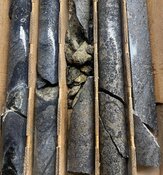While technology stocks such as Nvidia Corp. (NVDA:NASDAQ) have dominated headlines in recent months, the gold and mining sector has quietly led the market over the past six months as investors sought the stability of tangible assets.
According to Mining.com, mining shares have outperformed the Nasdaq 100 by more than 40% over the past six months.
Reflecting this broader trend, the U.S. government has taken a 10% equity stake in Trilogy Metals Inc. (TMQ:NYSEAmerican; TMQ:TSX) as part of a US$35.6 million initiative to strengthen domestic access to critical minerals.
According to The Globe and Mail, the U.S. government agreed to purchase 16.4 million Trilogy shares at US$2.17 apiece, providing a 10% ownership interest and the right to acquire additional shares over a 10-year period at an exercise price of one cent per share. The investment coincided with a presidential decision to approve permits for the Ambler Access Project, a 340-kilometer industrial-use road in Alaska that would connect the remote Upper Kobuk Mineral Projects (UKMP) to the Dalton Highway.
The UKMP is held through Ambler Metals LLC, a 50/50 joint venture between Trilogy Metals Inc. and South32 Ltd. The project contains copper, zinc, lead, gold, and silver deposits and has been identified as a key component of the United States' critical minerals strategy.
"This proposed partnership with the U.S. government represents a significant milestone for Trilogy Metals and for the development of a secure, domestic supply of critical minerals for America in Alaska," said Trilogy President and CEO Tony Giardini in a company news release. "The Department of War's interest underscores the strategic importance of the Upper Kobuk mineral projects in supporting U.S. energy, technology, and national security priorities."
In announcing the investment from the Oval Office, President Donald Trump said the decision was part of a broader effort to "reverse years of missed opportunity" in resource development. He described the Ambler Road as "something that should have been long operating and making billions of dollars for our country and supplying a lot of energy and minerals." The 340-kilometer highway will connect Alaska's Northern Brooks Range to remote mining districts containing copper, cobalt, gallium, germanium, and other strategic minerals, according to Bloomberg.
The announcement followed President Donald Trump's decision to reverse a 2024 ruling by the previous administration that had blocked construction of the Ambler Road on environmental grounds. The reinstated authorization directs federal agencies to reissue the necessary approvals for the project while maintaining protections for wildlife, fish habitats, and nearby communities. The Ambler Road, held by the Alaska Industrial Development and Export Authority, is designated for industrial use only to enable access to Alaska's critical mineral deposits.
Under the agreement, the U.S. Department of War will invest US$17.8 million in new Trilogy units — each comprising one common share and 3/4 of a 10-year warrant — and another US$17.8 million to purchase shares from South32. The arrangement also gives the Department the right to appoint an independent director to Trilogy's board for a 3-year term. Trilogy and South32 have committed to using the proceeds to advance exploration and development across the Upper Kobuk district, with any further share acquisitions contingent on the completion of the Ambler Road, now permitted for construction.
Copper Surges Amid U.S. Policy Shifts
As reported in an October 4 post from The Economic Times, copper prices climbed to record levels across major global exchanges, supported by tightening supply, strong demand from green energy sectors, and ongoing geopolitical uncertainty.
The report noted that prices on the London Metal Exchange approached US$10,000 per tonne, while the Shanghai Futures Exchange recorded gains of more than 8% for the year. Analysts attributed the rally to "a perfect storm of supply constraints and booming demand," emphasizing that electric vehicles use up to four times more copper than conventional cars and that renewable energy infrastructure remains heavily copper-dependent.
Shares of Trilogy Metals surged sharply following the announcement, with the company's U.S.-listed shares rising more than 200% on Tuesday, jumping from US$2.09 to US$7.37 in early trading, according to CNBC and MarketWatch.
The International Copper Study Group reported that global consumption continued to outpace supply as older mines faced declining ore grades and new projects struggled to come online. Inventories at the London Metal Exchange were said to have dropped by more than 66% over the past year.
The Economic Times also highlighted the influence of monetary policy and foreign exchange trends on copper's momentum.
A more accommodative U.S. Federal Reserve and a weaker dollar made the metal less expensive for international buyers, further boosting demand. Meanwhile, geopolitical tensions and newly imposed trade tariffs added volatility to the market, as supply chain realignments and rising fuel costs placed pressure on producers.
Mining executive Robert Friedland commented on the trend in a post on X, recalling that when copper traded near US$8,500 per tonne in late 2023, he cautioned that "nearly any disruption could result in a sharp upward move in prices." He said the combination of grid expansion, national security priorities, and challenges in developing new mines had since pushed the market to sustain levels above US$10,000 per tonne.
Rising Tide in Critical Metals, Then a Bold Government Move
Over the past two years, the mining sector (especially commodities tied to electrification, energy storage, and defense) has captured renewed investor interest. Prices for copper, lithium, nickel, and rare earth elements have surged amid tightening supply and increasing demand from electric vehicles, renewable infrastructure, and advanced electronics.
According to McKinsey & Company, global demand for metals such as copper, nickel, and lithium may exceed supply by 2035, as new mine development struggles to keep pace with the energy transition. The global critical minerals market is projected to grow substantially, driven by government policies aimed at securing domestic supply chains and reducing dependence on processing hubs abroad. Meanwhile, recent moves by China to limit exports of rare earths have triggered sharp gains in shares of miners like MP Materials Corp. (MP:NYSE) and others focused on non-Chinese processing routes.
Against that backdrop, the U.S. government's decision to take a 10% stake in Trilogy Metals represents a striking intersection of industrial policy and mineral markets. The investment, announced in early October, amounts to US$35.6 million and gives Washington a direct shareholding in a company holding Alaska's Upper Kobuk Mineral Projects, which include deposits of copper, zinc, lead, gold, and silver. The government also secured warrants to acquire additional shares over ten years at a nominal price, contingent on completion of the Ambler Access Project, which will enable transportation infrastructure to those deposits. In response, Trilogy's U.S.–listed shares soared, climbing more than 200% in a single session.
While uncommon, this is not the first time Washington has taken direct ownership in a publicly traded company. According to Reuters, the U.S. government has explored taking equity stakes in semiconductor manufacturers under the CHIPS Act, signaling a shift from traditional grant programs toward partial ownership in strategic industries.
Cantor Fitzgerald upgraded its rating on Trilogy Metals from Speculative Buy to Buy and raised its one-year price target from US$3.00 per share to US$10.00 per share.
The legal framework for such equity arrangements was outlined in a detailed analysis by Lawfare, which noted that CHIPS Act funds were used to acquire shares in Intel as part of a new model of industrial policy combining investment incentives with ownership rights. Historically, the federal government has taken similar action during crises. In 2009, the U.S. Treasury assumed roughly 60.8% ownership of General Motors following its bankruptcy reorganization, a stake later sold once the automaker returned to profitability.
According to a recent analysis by White & Case LLP, the Trump administration's "energy dominance" policy has expanded into a full-scale critical-minerals initiative aimed at reducing U.S. dependence on foreign supply. The government has designated copper as a critical mineral and introduced a three-part framework combining deregulation, federal financing, and new trade tools to accelerate project approvals and secure domestic and allied-nation production. This approach includes the creation of the National Energy Dominance Council to coordinate permitting reform, the use of the Department of Defense [War] and Export-Import Bank to finance projects vital to national security, and the imposition of new tariffs on semi-refined copper and other strategic metals to encourage domestic smelting and refining.
The White & Case report noted that these measures mark a turning point in U.S. industrial policy, with copper, rare earths, uranium, and gold projects expected to benefit most from accelerated review and government backing. The federal government has also expanded its overseas financing through the U.S. International Development Finance Corporation to secure critical mineral value chains in regions such as Africa and Ukraine.
Parallel market data from DataM Intelligence showed that the U.S. critical-minerals market reached an estimated US$328.19 billion in 2024 and is projected to grow to US$586.63 billion by 2032, reflecting a compound annual growth rate of 7.53%. The report attributed this expansion to increasing demand for lithium, cobalt, nickel, and rare-earth elements used in electric vehicles, renewable energy systems, and defense technologies. It added that government investments, such as the U.S. government's 5% equity stake in Lithium Americas' (LAC:NYSE) Thacker Pass project and the 10% stake in Trilogy Metals' Alaska venture, highlight Washington's broader strategy to bolster domestic mineral security and diversify supply away from China, which controls about 70% of global rare-earth extraction and 90% of processing capacity.
Market Reaction and Industry Context
Shares of Trilogy Metals surged sharply following the announcement, with the company's U.S.-listed shares rising more than 200% on Tuesday, jumping from US$2.09 to US$7.37 in early trading, according to CNBC and MarketWatch. The dramatic move reflected investor enthusiasm for what the White House characterized as part of a broader initiative to strengthen domestic supply chains for key materials and reduce reliance on foreign sources, particularly China.
The agreement includes warrants that give the U.S. government the right to purchase an additional 7.5% of the company, while Trilogy's joint venture partner, South32 Ltd., sold US$17.8 million worth of its shares to the government and issued a call option for another 6.2 million shares, MarketWatch reported. The deal followed earlier federal investments in North American resource developers, including MP Materials and Lithium Americas, reflecting Washington's increasing focus on securing critical minerals vital to national and economic security.
In a research note issued on October 7, Cantor Fitzgerald analyst Mike Kozak described the investment and concurrent executive order approving the Ambler Road as a material inflection point for the company. He characterized the Upper Kobuk Mineral Projects (UKMP) as one of the most significant undeveloped polymetallic districts in North America, stating that direct federal participation "effectively guarantees the development of this mineral-rich region" and enhances Trilogy's ability to secure future financing and permitting support under the FAST-41 federal streamlining process.
Cantor Fitzgerald upgraded its rating on Trilogy Metals from Speculative Buy to Buy and raised its one-year price target from US$3.00 per share to US$10.00 per share. Kozak cited the federal equity stake as a key factor driving the re-rating, explaining that Trilogy's valuation multiple was increased to 1.5 times its net asset value, consistent with other U.S. mining projects that recently received direct government investment. He added that federal backing of the Ambler Road and UKMP "provides a clearer path to development" and positions Trilogy to advance one of the highest-grade copper projects in the country.
Advancing Alaska's Critical Minerals Corridor
Trilogy Metals' October 2025 investor presentation outlined several near-term milestones, including the commencement of permitting for the Arctic Project and Department of Defense [War] funding to support the Bornite Project's cobalt supply chain. These initiatives align with federal efforts to enhance domestic production of copper, zinc, cobalt, and germanium — minerals essential to renewable energy, defense technologies, and data infrastructure.
The Arctic Project, one of the highest-grade copper deposits globally with an average grade of approximately 5% copper equivalent, carries a pre-tax net present value of US$1.5 billion and a 25.8% internal rate of return based on feasibility study results. The Bornite Project adds 6.5 billion pounds of inferred copper resources and cobalt credits, which could extend the Upper Kobuk district's potential mine life beyond 30 years.
 Streetwise Ownership Overview*
Streetwise Ownership Overview*
Trilogy Metals Inc. (TMQ:NYSEAmerican; TMQ:TSX)
With established partnerships that include South32 and the Alaska Industrial Development and Export Authority, Trilogy Metals holds a central position in the U.S. government's strategy to secure domestic critical mineral supply chains. Located in a stable jurisdiction with clear permitting frameworks, the company's Alaska-based assets reflect a renewed federal emphasis on resource independence and economic resilience through responsible mineral development.
Ownership and Share Structure
According to Refinitiv as of October 8, 8.32% of Trilogy Metals is held by management and insiders. Of them, Tony Giardini holds the most with 4.39%, followed by Elanie Sanders at 1.92%, and Richard Gosse with 1.20%.
Strategic entity, South32 International Investment Holdings, holds 11.32%.
Institutions sit at 39.71% with The Electrum Group LLC with the most at 19.74%. The rest is retail.
Trilogy currently has 164.31 million outstanding shares, a market capitalization of CA$1.66 billion, and a 52-week range of CA$0.47 to CA$7.98.
| Want to be the first to know about interesting Copper and Critical Metals investment ideas? Sign up to receive the FREE Streetwise Reports' newsletter. | Subscribe |
Important Disclosures:
- James Guttman wrote this article for Streetwise Reports LLC and provides services to Streetwise Reports as an employee.
- This article does not constitute investment advice and is not a solicitation for any investment. Streetwise Reports does not render general or specific investment advice and the information on Streetwise Reports should not be considered a recommendation to buy or sell any security. Each reader is encouraged to consult with his or her personal financial adviser and perform their own comprehensive investment research. By opening this page, each reader accepts and agrees to Streetwise Reports' terms of use and full legal disclaimer. Streetwise Reports does not endorse or recommend the business, products, services or securities of any company.
For additional disclosures, please click here.










































